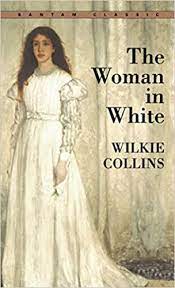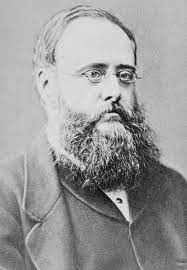The Woman in White Page #8
The Woman in White is Wilkie Collins's fifth published novel, written in 1859. It is a mystery novel and falls under the genre of "sensation novels". The story is an early example of detective fiction with protagonist Walter Hartright employing many of the sleuthing techniques of later private detectives
questions put to me by the woman in white, after my ill-considered promise to leave her free to act as she pleased, had suggested the conclusion either that she was naturally flighty and unsettled, or that some recent shock of terror had disturbed the balance of her faculties. But the idea of absolute insanity which we all associate with the very name of an Asylum, had, I can honestly declare, never occurred to me, in connection with her. I had seen nothing, in her language or her actions, to justify it at the time; and even with the new light thrown on her by the words which the stranger had addressed to the policeman, I could see nothing to justify it now. What had I done? Assisted the victim of the most horrible of all false imprisonments to escape; or cast loose on the wide world of London an unfortunate creature, whose actions it was my duty, and every man's duty, mercifully to control? I turned sick at heart when the question occurred to me, and when I felt self-reproachfully that it was asked too late. In the disturbed state of my mind, it was useless to think of going to bed, when I at last got back to my chambers in Clement's Inn. Before many hours elapsed it would be necessary to start on my journey to Cumberland. I sat down and tried, first to sketch, then to read--but the woman in white got between me and my pencil, between me and my book. Had the forlorn creature come to any harm? That was my first thought, though I shrank selfishly from confronting it. Other thoughts followed, on which it was less harrowing to dwell. Where had she stopped the cab? What had become of her now? Had she been traced and captured by the men in the chaise? Or was she still capable of controlling her own actions; and were we two following our widely parted roads towards one point in the mysterious future, at which we were to meet once more? It was a relief when the hour came to lock my door, to bid farewell to London pursuits, London pupils, and London friends, and to be in movement again towards new interests and a new life. Even the bustle and confusion at the railway terminus, so wearisome and bewildering at other times, roused me and did me good. My travelling instructions directed me to go to Carlisle, and then to diverge by a branch railway which ran in the direction of the coast. As a misfortune to begin with, our engine broke down between Lancaster and Carlisle. The delay occasioned by this accident caused me to be too late for the branch train, by which I was to have gone on immediately. I had to wait some hours; and when a later train finally deposited me at the nearest station to Limmeridge House, it was past ten, and the night was so dark that I could hardly see my way to the pony-chaise which Mr. Fairlie had ordered to be in waiting for me. The driver was evidently discomposed by the lateness of my arrival. He was in that state of highly respectful sulkiness which is peculiar to English servants. We drove away slowly through the darkness in perfect silence. The roads were bad, and the dense obscurity of the night increased the difficulty of getting over the ground quickly. It was, by my watch, nearly an hour and a half from the time of our leaving the station before I heard the sound of the sea in the distance, and the crunch of our wheels on a smooth gravel drive. We had passed one gate before entering the drive, and we passed another before we drew up at the house. I was received by a solemn man-servant out of livery, was informed that the family had retired for the night, and was then led into a large and lofty room where my supper was awaiting me, in a forlorn manner, at one extremity of a lonesome mahogany wilderness of dining-table. I was too tired and out of spirits to eat or drink much, especially with the solemn servant waiting on me as elaborately as if a small dinner party had arrived at the house instead of a solitary man. In a quarter of an hour I was ready to be taken up to my bedchamber. The solemn servant conducted me into a prettily furnished room--said, "Breakfast at nine o'clock, sir"--looked all round him to see that everything was in its proper place, and noiselessly withdrew. "What shall I see in my dreams to-night?" I thought to myself, as I put out the candle; "the woman in white? or the unknown inhabitants of this Cumberland mansion?" It was a strange sensation to be sleeping in the house, like a friend of the family, and yet not to know one of the inmates, even by sight! VI When I rose the next morning and drew up my blind, the sea opened before me joyously under the broad August sunlight, and the distant coast of Scotland fringed the horizon with its lines of melting blue. The view was such a surprise, and such a change to me, after my weary London experience of brick and mortar landscape, that I seemed to burst into a new life and a new set of thoughts the moment I looked at it. A confused sensation of having suddenly lost my familiarity with the past, without acquiring any additional clearness of idea in reference to the present or the future, took possession of my mind. Circumstances that were but a few days old faded back in my memory, as if they had happened months and months since. Pesca's quaint announcement of the means by which he had procured me my present employment; the farewell evening I had passed with my mother and sister; even my mysterious adventure on the way home from Hampstead--had all become like events which might have occurred at some former epoch of my existence. Although the woman in white was still in my mind, the image of her seemed to have grown dull and faint already. A little before nine o'clock, I descended to the ground-floor of the house. The solemn man-servant of the night before met me wandering among the passages, and compassionately showed me the way to the breakfast-room. My first glance round me, as the man opened the door, disclosed a well-furnished breakfast-table, standing in the middle of a long room, with many windows in it. I looked from the table to the window farthest from me, and saw a lady standing at it, with her back turned towards me. The instant my eyes rested on her, I was struck by the rare beauty of her form, and by the unaffected grace of her attitude. Her figure was tall, yet not too tall; comely and well-developed, yet not fat; her head set on her shoulders with an easy, pliant firmness; her waist, perfection in the eyes of a man, for it occupied its natural place, it filled out its natural circle, it was visibly and delightfully undeformed by stays. She had not heard my entrance into the room; and I allowed myself the luxury of admiring her for a few moments, before I moved one of the chairs near me, as the least embarrassing means of attracting her attention. She turned towards me immediately. The easy elegance of every movement of her limbs and body as soon as she began to advance from the far end of the room, set me in a flutter of expectation to see her face clearly. She left the
Translation
Translate and read this book in other languages:
Select another language:
- - Select -
- 简体中文 (Chinese - Simplified)
- 繁體中文 (Chinese - Traditional)
- Español (Spanish)
- Esperanto (Esperanto)
- 日本語 (Japanese)
- Português (Portuguese)
- Deutsch (German)
- العربية (Arabic)
- Français (French)
- Русский (Russian)
- ಕನ್ನಡ (Kannada)
- 한국어 (Korean)
- עברית (Hebrew)
- Gaeilge (Irish)
- Українська (Ukrainian)
- اردو (Urdu)
- Magyar (Hungarian)
- मानक हिन्दी (Hindi)
- Indonesia (Indonesian)
- Italiano (Italian)
- தமிழ் (Tamil)
- Türkçe (Turkish)
- తెలుగు (Telugu)
- ภาษาไทย (Thai)
- Tiếng Việt (Vietnamese)
- Čeština (Czech)
- Polski (Polish)
- Bahasa Indonesia (Indonesian)
- Românește (Romanian)
- Nederlands (Dutch)
- Ελληνικά (Greek)
- Latinum (Latin)
- Svenska (Swedish)
- Dansk (Danish)
- Suomi (Finnish)
- فارسی (Persian)
- ייִדיש (Yiddish)
- հայերեն (Armenian)
- Norsk (Norwegian)
- English (English)
Citation
Use the citation below to add this book to your bibliography:
Style:MLAChicagoAPA
"The Woman in White Books." Literature.com. STANDS4 LLC, 2025. Web. 22 Jan. 2025. <https://www.literature.com/book/the_woman_in_white_1567>.




Discuss this The Woman in White book with the community:
Report Comment
We're doing our best to make sure our content is useful, accurate and safe.
If by any chance you spot an inappropriate comment while navigating through our website please use this form to let us know, and we'll take care of it shortly.
Attachment
You need to be logged in to favorite.
Log In